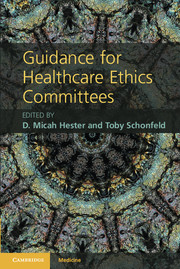Book contents
- Frontmatter
- Contents
- Contributors
- Preface
- Section 1 The Context of Healthcare Ethics Committee Work
- Section 2 Consultation
- 5 Mission, vision, goals: defining the parameters of ethics consultation
- 6 Ethics consultation process
- 7 Informed consent, shared decision-making, and the ethics committee
- 8 Decision-making capacity
- 9 Family dynamics and surrogate decision-making
- 10 Confidentiality
- 11 Advance care planning and end-of-life decision-making
- 12 Medical futility
- 13 Ethical issues in reproduction
- 14 Ethical issues in neonatology
- 15 Ethical issues in pediatrics
- Section 3 Policy Development and Organizational Issues
- Section 4 Educating Others
- Index
- References
13 - Ethical issues in reproduction
Published online by Cambridge University Press: 05 August 2012
- Frontmatter
- Contents
- Contributors
- Preface
- Section 1 The Context of Healthcare Ethics Committee Work
- Section 2 Consultation
- 5 Mission, vision, goals: defining the parameters of ethics consultation
- 6 Ethics consultation process
- 7 Informed consent, shared decision-making, and the ethics committee
- 8 Decision-making capacity
- 9 Family dynamics and surrogate decision-making
- 10 Confidentiality
- 11 Advance care planning and end-of-life decision-making
- 12 Medical futility
- 13 Ethical issues in reproduction
- 14 Ethical issues in neonatology
- 15 Ethical issues in pediatrics
- Section 3 Policy Development and Organizational Issues
- Section 4 Educating Others
- Index
- References
Summary
Objectives
Identify and explain the major ethical considerations speciic to reproductive decision-making, including the moral status of the fetus, the status of the pregnant woman, and the maternal–fetal relationship.
Describe ethical challenges associated with contraception and pregnancy termination, including the legal and cultural context surrounding conscientious refusal.
Describe the ethical challenges associated with conception and loss, including management decisions in the context of significant fetal anomalies.
Describe the ethical challenges involved in the management of pregnancy, including potential conlicts between maternal health needs or behaviors and fetal well-being, and decisions about mode of delivery.
Case 1
T.D. is a 22-year-old woman who presented to the emergency room after being raped by a coworker. She underwent a full rape work-up; although standard procedure is to offer her emergency contraception, the emergency room physician felt that doing so would be a conflict of conscience for him, so he refused to write the order. The nursing staff raised concerns that the physician was putting his own interests before those of his patient and failing to provide standard care. The physician countered that it is his right – even his obligation – to act in accordance with his conscience.
Case 2
L.G. is a 28-year-old with a history of multiple miscarriages. In her last pregnancy, a cerclage (a stitch around the cervix) was placed; she carried the pregnancy to term and delivered a healthy child. Now pregnant at 14 weeks, she had planned cerclage placement again; however, an ultrasound revealed an anencephalic fetus. The patient declined abortion and requested the cerclage be placed, but her doctor refused, arguing the risks of cerclage placement (anesthesia, infection) were not justified absent the possibility of meaningful life for her child.
- Type
- Chapter
- Information
- Guidance for Healthcare Ethics Committees , pp. 98 - 105Publisher: Cambridge University PressPrint publication year: 2012
References
- 1
- Cited by

